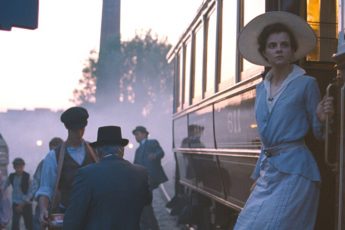Lost in Translation
István Szabó’s Sweet Emma, Dear Böbe (Édes Emma, drága Böbe – vázlatok, aktok, 1992)
Vol. 44 (August 2014) by Moritz Pfeifer
István Szabó’s most improvised film is also his most unique. Dear Emma, Sweet Böbe was shot with no budget in the immediacy of the crumbling Kádár/Grosz regime in 1992. The film portrays the friendship of two women who come to Budapest from the countryside to teach Russian. The only problem is that Russian is no longer on the curriculum. Schools now ask for compulsory English which the two young women never learned. And so they are forced to switch roles and begin studying English at night school.
The film is highly metaphorical. The women become symbols for the ups and down of the “free” market economy. As Russian teachers they are seen as excess supply and hence without value. Even worse, they were schooled by an antiquated command-educational system which may have had good plans for them but failed to realize that there’s an excess demand for English, the language of the very globalized structure which, if it had been applied in the first place, would also have kept them from becoming useless. Such, at least, are the rules of the game by which the society Szabó depicts plays. Ideals of social embeddedness are crushed with a utilitarian hammer.
Szabó wrote and directed this film in a couple of weeks time. It is intuitive, violent, and chaotic and thus in stark contrast with the slow-paced, organized rhythm of his historical films in which everything – even events taking place during the most turbulent and violent times, like Nazi Germany or the crumbling Austrian Empire – seems to have its rightful place. In these films, Szabó’s view on history is also highly individualistic or existentialist as opposed to social or systemic. Take the portrait of Hendrig Höfgens, the Nazi theater actor in his film Mephisto, who turns into a Nazi because of careerist ambitions. The big question in this film is one of personal freedom. Is it possible to be a good actor – and perhaps even free – if one works under the auspices of a terrible/freedom-thwarting regime?
In Dear Emma, Sweet Böbe, questions of personal responsibility and individual freedom are completely cast aside and replaced by a systemic view on history. Emma and Böbe are simply at the wrong place in the wrong time. In terms of personal freedom, this might also be the reason why there is no real difference between their situation before and after the change. Either way, they are victims of political circumstance. Szabó even suggests that working as an English teacher doesn’t change much since it remains an obligation. There is no reason to suppose that the women have a particular love for Russian literature which makes them regret that they cannot exercise their profession. It’s a lose-lose situation. Nevertheless, they are forced to feel free, individual and hence responsible, since these are the dictates of the new world order. It’s up to them to learn a new language, find a job, get by.
Regarding this schizophrenic situation, Böbe’s suicide is not surprising. I have observed elsewhere that suicide was a much-used dramatic device in films shot in the aftermaths of Communism. Romanian directors Lucian Pintilie and Mircea Daneliuc have used it to portray characters which sacrifice themselves for the sake of the old world order, not necessarily to preserve it, but almost to protest that nobody in the new world is there to recognize their suffering. The strongest aspect of Szabó’s film is to have captured this desperate atmosphere which probably haunted many people who suddenly found that society had no more use for them and who were, as a result, forced to feel individually responsible for something they could hardly give an account for.




Leave a Comment